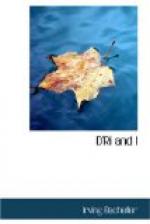“These greenhorns are not nice to play with,” he said. “They’re like some guns—loaded when you don’t expect it. We ’ve had enough skylarking.”
And when the sick man came out of hospital he went to the guard-house.
After we had shown our mettle the general always had a good word for D’ri and me, and he put us to the front in every difficult enterprise.
VI
We had been four months in Ogdensburg, waiting vainly for some provocation to fight. Our own drilling was the only sign of war we could see on either side of the river. At first many moved out of the village, but the mill was kept running, and after a little they began to come back. The farms on each side of the river looked as peaceful as they had ever looked. The command had grown rapidly. Thurst Miles of my own neighborhood had come to enlist shortly after D’ri and I enlisted, and was now in my company.
In September, General Brown was ordered to the Western frontier, and Captain Forsyth came to command us. Early in the morning of October 2, a man came galloping up the shore with a warning, saying that the river was black with boats a little way down. Some of us climbed to the barracks roof, from which we could see and count them. There were forty, with two gunboats. Cannonading began before the town was fairly awake. First a big ball went over the house-tops, hitting a cupola on a church roof and sending bell and timbers with a crash into somebody’s dooryard. Then all over the village hens began to cackle and children to wail. People came running out of doors half dressed. A woman, gathering chips in her dooryard, dropped them, lifted her dress above her head, and ran for the house. Unable to see her way, she went around in a wide circle for a minute or two, while the soldiers were laughing. Another ball hit a big water-tank on top of the lead-works. It hurled broken staves and a big slop of water upon the housetops, and rolled a great iron hoop over roofs into the street below, where it rolled on, chasing a group of men, who ran for their lives before it. The attack was an odd sort of comedy all through, for nobody was hurt, and all were frightened save those of us who were amused. Our cannon gave quick reply, and soon the British stopped firing and drew near. We knew that they would try to force a landing, and were ready for them. We drove them back, when they put off, and that was the end of it.
Next came the fight on the ice in February—a thing not highly creditable to us, albeit we were then but a handful and they were many. But D’ri and I had no cause for shame of our part in it. We wallowed to our waists in the snow, and it was red enough in front of us. But the others gave way there on the edge of the river, and we had to follow. We knew when it was time to run; we were never in the rear rank even then. We made off




